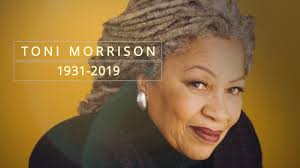Thanks for the Memory: A Posthumous letter to the late Toni Morrison
- Dr. Ondra Dismukes, Contributing Blogger
- Mar 6, 2020
- 4 min read
I count it both a sad coincidence and a tremendous honor to pay tribute to another one of my literary muses. In 2019, I bid farewell to Ntozake Shange, author of the choreopoem for colored girls who have considered suicide when the rainbow is enuf (1974) in a blog I titled "An Open, Posthumous Letter to Ntozake Shange." Now, as we celebrate Women's History Month, I am honored to write this open, posthumous "Thank-You" note to another of my muses whom we lost in 2019: Ms. Chloe Ardelia Wofford, aka Dr. Toni Morrison.
Dear Professor Morrison:
I know you do not remember me. I was one of many scholars of your work who stood in awe of you in 2005, when you graced our presence at the opening reception of the fourth biennial Toni Morrison Society Conference. I and some of my graduate colleagues eagerly greeted you and asked you for your autograph, to which you quickly responded “I’m a scholar, not a celebrity!” Of course, we shrank away, feeling embarrassed and even juvenile in our reaction to your response; we had offended one of the greats. In our defense, though, to be a celebrity means to be celebrated; and today, I celebrate your legacy and I thank you for gifting us, your readers, with your unique writing style that blends French philosopher Pierre Nora’s theory on sites of memory, the magical realism of Gabriel Garcia Marquez, and the nostalgic narrative voice of William Faulkner, to introduce the concept of cultural memory – those places, persons, or objects that hold evidence of people’s cultural heritage.
Thank you for giving us the Pulitzer Prize-winning novel Beloved (1987), in which you incorporate Pierre Nora’s theory of site of memory - those persons, places, and/or objects that remind people of specific aspects of their past. You erect the memory of Margaret Garner, an African American slave who killed her baby so that the child would not live in slavery. Thank you for conjuring her memory through Sethe, the fictional character and mother of the titular character Beloved, who visits her mother in spirit. Thank you, as well, for engendering Garner’s memory as the librettist for “Margaret Garner: An Opera in Two Acts". My colleagues and I had attended this opera just hours before you graced our presence at the opening reception in your honor. Yes, we were in awe, but not of your celebrity; rather, we wanted to celebrate the magnitude of your scholarship.
Thank you for giving us your 1977 masterpiece Song of Solomon, in which you re-image Gabriel Garcia Marquez’s concept of magical realism to evoke cultural memory. Herein, you introduce us to the myth of the flying Africans, who had the uncanny ability to fly away from a life of slavery in Virginia to the freedom they knew with their family in Africa. After hearing a children’s song, protagonist Milkman learns that it tells the story of his ancestry and that he and his family are actual descendants of these flying Africans. Upon being reacquainted with the memory of his ancestors, Milkman experiences his own physical and spiritual transformation that allows him to become the agent of healing for a physically and spiritually fragmented family unit. No wonder you garnered the National Book Critics Circle Award for this classic - and now canonical - work of literature.
Thank you for channeling the narrative musings of William Faulkner and luring us in as participants in your 1992 novel, Jazz, the metaphorical title for the story that renders the competing perspectives of characters set in 1920s Harlem juxtaposed against their experiences in the mid-19th Century American South. As a result of these juxtaposed settings, Morrison, reminds us, her readers, how setting affects perspective and of the importance of multiple perspectives in finding truth. As its title suggests, Jazz renders a cacophony of voices whose singular value is enhanced in collaboration with others. Thank you, Professor Morrison, for reminding us as you do in your 1993 Nobel Prize lecture, “How lovely it is, this thing we have done – together” (Morrison).
You deliver a similar sentiment in The Ant or the Grasshopper, the children’s book you penned in 2004 alongside Pascal Lemaitre and your son, Slade, as the illustrator. Thank you for introducing us to these animated characters whose rhythmic banter creates the jazz-like riffs that underlie African American oral culture and remind us of the significance of working together for our survival. Thank you for creating a story that quickly became one of my son’s favorite bedtime stories and spurred his early interest in reading and music. Thank you for gifting us with a model of the beauty that comes from collaboration between parent and child.
Finally, Professor Morrison, I thank you for the body of work you leave us that reminds us of the importance of embracing our shared yet disparate histories in order to understand the world in which we live. Thank you, Professor Morrison, for the memory!
Works Cited
Morrison, Toni. Nobel Lecture. NobelPrize.org. Nobel Media AB 2020. Accessed 1 February 2020. https://www.nobelprize.org/prizes/literature/1993/morrison/lecture/>
“Remembering Toni Morrison: Looking back on the work of a literary genius.” Department of African American Studies. College of Liberal Arts and Sciences, U of Illinois Urbana-Champagne. 8 August 2019. https://afro.illinois.edu/news/2019-08-08/remembering-toni-morrison











Comments